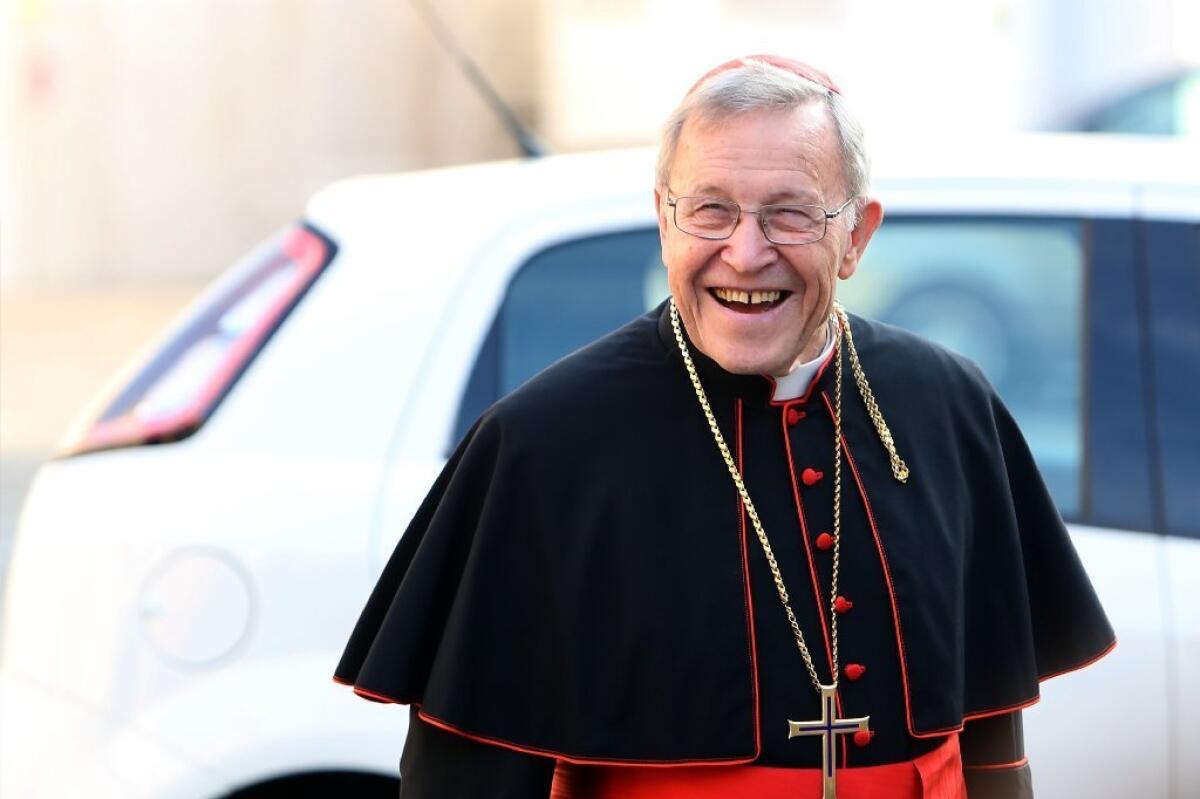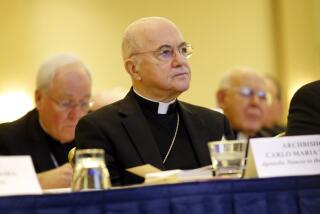Opinion: Catholics, Africans, gays and the race card

The Roman Catholic Synod of Bishops that ended over the weekend was a remarkable exercise in transparency, with liberal and conservative prelates openly sparring over whether the church should adopt a more welcoming approach to gays and to Catholics who divorced and remarried.
In the end, the assembly watered down language in the section about ministering to people with “homosexual orientation.” Neither that part of the final report nor a recommendation that the church study admitting divorced and remarried Catholics to Holy Communion received a two-thirds majority.
The intra-ecclesiatical dispute included a fascinating sideshow in which conservatives accused liberals allied with Pope Francis of disrespecting African bishops.
It started when the pope appointed several clerics -- including Cardinal Donald Wuerl of Washington, D.C. -- to the team responsible for drafting the “relatio” or report of the proceedings of the synod, which explored issues related to the family.
The Rev. John Zuhlsdorf, the conservative Catholic blogger known as Father Z, noted an interesting omission in the list of appointees.
“No Africans are on the drafting committee, and yet is it clear that the state of the family in Africa is considered pretty important,” Zuhlsdorf wrote. “I guess it isn’t as important as the state of the family in the wealthy West and Northern Hemisphere. Isn’t that interesting?”
What you need to know in order to appreciate this dig is that Roman Catholic bishops in Africa tend to be much more traditionalist about homosexuality -- to put it mildly -- than their counterparts in the West.
Then things got really interesting. The proposal that remarried Catholics might be admitted to Communion after they followed a “penitential path” is the pet project of Cardinal Walter Kasper, a German theologian who is close to the pope. Kasper has emerged as a leading voice of the church’s liberal wing.
Kasper was interviewed by a journalist who quoted him as saying: “Africa is totally different from the West. Also Asian and Muslim countries, they’re very different, especially about gays. You can’t speak about this with Africans and people of Muslim countries. It’s not possible. It’s a taboo.” Kasper supposedly added that African bishops “should not tell us too much what we have to do.”
Kasper denied that he had made the remarks, the journalist responded by posting a recording, and conservatives clucked about another example of liberal condescension toward black Africans.
This argument is what high school debaters call a “turnaround.” Liberals among the clergy, like liberals in general, are supposedly highly attuned to multiculturalism and sensitive to the opinions of the historically oppressed. So what better comeback than to accuse them of neocolonial, if not racist, attitudes?
This debating point has a long history. In the 1990s, disagreements over homosexuality divided the Anglican Communion, with African bishops supporting the traditional view and many Western bishops arguing for a more liberal policy. John Shelby Spong, a bishop in the U.S. Episcopal Church in the United States, was quoted as saying that African Christians had “moved out of animism into a very superstitious kind of Christianity. They’ve yet to face the intellectual revolution of Copernicus and Einstein that we’ve had to face in the developing world; that is just not on their radar screen.”
As Miranda K. Hassett recounted in a doctoral dissertation on the controversy: “Spong’s remarks and the resultant publicity provided an unparalleled opportunity for Northern conservatives to denounce American liberalism by asserting its underlying arrogance and racism, and to distance themselves from such sentiments and affirm their own commitment to solidarity with African Christians.” (Spong apologized, saying that “superstitious” was “an unfortunate word” and that he hadn’t meant to use the term to label African Christians.)
Granted, there is something disingenuous about conservative Christians asking liberals to check their white privilege. As the conservative Catholic writer Damian Thompson conceded: “Some Catholic right-wingers aren’t big into anti-racism, shall we say.... Now they get to play the anti-racist card.”
But even if it’s an argument of convenience, the conservatives’ criticism of prelates such as Spong and Kasper illuminates an important paradox that is also evident in secular political discourse: Western liberals support liberation for gays and women, but they are sometimes loath to criticize countries or cultures in which their liberal values are anathema, lest they be accused of neocolonial arrogance.
Can you support equal rights for gays and women as universal principles, and also respect cultural diversity? It’s a hard circle to square, even if you’re a cardinal.
Follow Michael McGough on Twitter @MichaelMcGough3.
More to Read
A cure for the common opinion
Get thought-provoking perspectives with our weekly newsletter.
You may occasionally receive promotional content from the Los Angeles Times.











